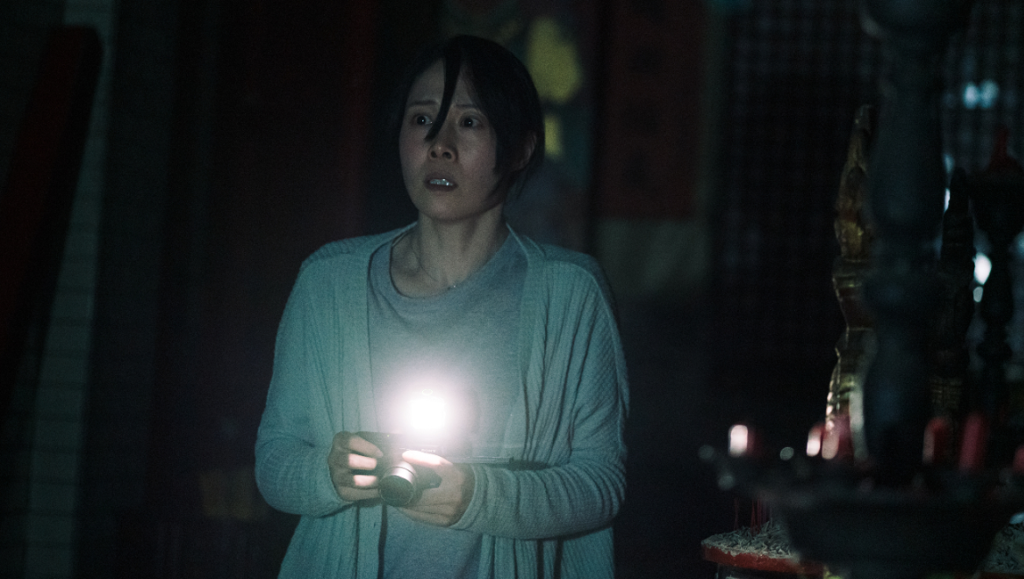Incantation is found footage horror that does little to add fresh twists to a stale formula, instead relying on a non-stop barrage of tired genre clichés.
“Do you believe in blessings?” Incantation opens with a voiceover, pontificating on the power of thoughts and how our intentions can affect outcomes in the real world. To illustrate this point, the voice tells us to “manipulate” a crude animation of a Ferris wheel — an optical illusion that actually seems to turn left or right at our whim — before asking us to do the same with a choppy video of a train either entering or leaving a tunnel. It’s the stuff of Web 1.0 chain emails and flash videos, and it’s emblematic of the film that follows, failing to meaningfully set up the ideas explored in this by-the-numbers found footage horror, instead relying on old-hat gimmicks that seem designed for only the most easily impressed members of the audience.
Ruo-nan (Hsuan-yen Tsai), main character and voice from the opening VO, runs a YouTube channel with her boyfriend A-tung (Sean Lin) and his brother A-yuan (Wen Ching-Yu), dedicated to investigating supposed supernatural phenomena. Their quest for content leads them to an obscure religious group, that is about to perform a ritual in the mountains. Surrounded by the group’s temples and sacred objects, the trio, predictably, show complete disregard for their surroundings, carving vulgar etchings into the side of a building and entering a tunnel system that is forbidden to them. Their transgressions catch up with them, however, when the two men die mysterious, violent deaths. Ruo-nan, who didn’t enter the tunnels, survives the ordeal but is severely traumatized, so much so that she loses custody of her daughter, Duoduo (Huang Hsin-ting). After six years of therapy, Ruo-nan is deemed well enough to care for her daughter again, but on the night of their reunion she comes face to face with the evil she experienced six years earlier. She begins recording her home as she tries desperately to find a way to rid herself and her daughter of the terrible curse that has befallen them.
Kevin Ko’s second horror feature (and fourth film overall) comes off of some considerable hype. Released in Taiwan in March of this year, it went on to become the country’s highest-grossing horror film ever before being picked up by Netflix. Unlike the most memorable entries into the genre, however, Incantation offers only the most superficial of thrills, mostly generated through loud banging noises, characters abruptly jolting at the camera, and tedious shake-o-vision, legitimized through its superfluous found footage conceit. More worthwhile works, like Kôji Shiraishi’s Lovecraftian pseudo-documentary Occult, utilize the subgenre’s framework to not only examine its characters in a unique way, but also to interrogate our relationship to the media we consume. Through the intense voyeurism inherent to found footage horror — and really, cinema in general — Shiraishi makes us unwitting culprits in the increasingly disturbing actions of its characters, adding an uncomfortable angle to what could’ve otherwise been a fairly conventional psychological horror story. Found footage also happens to offer a convenient way to work around budgetary constraints, and unfortunately, Incantation feels less like an attempt at exploring the possibilities of the format and more like an attempt at getting away with terrible cinematography.
Ko’s film offers little in the way of fresh twists on the stale formula, and even the well-established tropes are handled poorly. It all feels painfully familiar: vague folk religion, semi-nude cultists staring eerily at the camera, demonic possessions, loud shrieks, slamming doors, flickering lights — it’s basically a non-stop barrage of tired genre clichés. It even has that webcam shot of a character violently banging his head against the table that has inexplicably become so popular with horror films of this kind. And choosing to tell the story via an unnecessarily confusing back-and-forth structure, constantly cutting between the present and six years ago, doesn’t do much to hide how hackneyed the plot really is.
Admittedly, Incantation handles some of its mushy family drama better than a lot of films of its ilk, but even that eventually devolves into cheap sentimentalism, complete with sappy music and not one, but two saccharine, misty-eyed speeches. In what seems like a bid for virality, the film also attempts to exploit the Internet hysteria surrounding trypophobia, a supposed irrational fear of clusters of holes, apparently unaware that this obsession hasn’t made waves in ages. It would be wrong to say that Ko squandered any potentially intriguing ideas because there is nothing here that would indicate this rote and painfully unoriginal exercise could’ve ever been more than it is. Incantation might offer some surprises for non-horror fans looking for a quick and simple scare, but everyone else is likely to be profoundly underwhelmed.
You can stream Kevin Ko’s Incantation on Netflix beginning on July 8.


Comments are closed.